from May. 11, 1865
William H. White Letter, May 11, 1865
-
Full Title
Letter from William H. White to his sister, May 11, 1865
-
Description
Letter written by William H. White from Camp of the Old Grand, Washington, D.C, to his sister in Milwaukee, Wisconsin, describing the reaction of the soldiers to the assassination of President Lincoln.
-
Transcription
[Page 1]
Camp of the Old Grand
Washington DC
May 11th 1865
{P.S. This is a perfectly lovely, warm, May day, and the gorse[?] hangs about- 16 ft- high at this writing}
Dear Sister
If I should follow suit, your letter would not be answered for a thousand years hence but as I am not inclined to take pattern from your negligent style in relation to answering letters, perhaps yours dated Apr. 18th & mailed May 8th stands a slim chance to be answered sometime during the present year. Although the job is commenced at this early date, it may not be completed before the year 1901. . . Well I perceive that you & J.G. are into it big as ever, (Dont [sic] know as you are ever out of it) By the way you spoke about J. T. K. & M. L. K.
[Page 2]
now I cant [sic] believe that M. L. K. was married to the one armed Jack, if she married him, ‘tis quite evident that she has got him to support for I very well know that J. T. K. cannot support a fly. However, if she is satisfied, it is all right, it is nothing to me who she marries. Reckon I can find something shaped like a feminine [sic] (or at least something that wears crinolines) in course of time! I dare not venture a letter to charming M. C.— think it would be running too much risk, I have no less than 20 lady correspondents in New England –most of them however are total strangers, cant [sic] tell but what some of them are blacker than the Ace of Hades. I dont [sic] intend to correspond with so many hereafter, 2 or 3 right pretty ones is enough for me.
[Page 3]
The Rebellion is supposed to be (if not quite) played out. Suppose some of the volunteers will be discharged soon, I havet [sic] think that Hancocks rect’s [recruits] will stand much show to get out of the service before their year expires. I have something less than 8 months yet to serve to complete my year. My Reg D left Winchester VA last week Thursday, & marched to Washington via Thoroughfare Gap---(distance 100 miles— took us 5 days to make the trip.—Expect to be to the Grand Reaiew Review which is expected to come off one of these days. . .
Our President has been assassinated yes, & the Nation mouurns the loss of it’s [sic] greatest Statesman & Ruler & the people both North & South mourns loss of their Truest, best friend. President Lincoln was like
[Page 4]
a Father & Brother to us all, & the Nation mournings is sincere, & heartfelt, Booth has been is caught, & has paid with his life, for the foul deed. The South have lost their best friend. They will be likely to find in Johnson a hard master to deal with . . . . Our Country is safe. Freedom shall live in America.
I must now begin to taper off a little else get another sheet—the latter will not pay for I havent much of anything more to pawn this time. You must try & answer this right off. Remember now, right off. Let me know about family affairs, etc. etc.
Address as before
Co. B 1st N.J. Nat.-Vol. Inf
Hancocks Corps
Washington D.C.
Yours in great haste
W. H. White
P.S. Regards to all inquiring friends.
-
Source
Samuel White Papers, 1862-1865. University of Wisconsin-Milwaukee Libraries, Archives Department
-
Rights
This item is in the public domain. As a service to other researchers, we request that users credit the University of Wisconsin-Milwaukee Libraries as the source.
-
Tags
-
Cite this Item
White, William. "Letter from William H. White to his sister, May 11, 1865". Remembering Lincoln. Web. Accessed December 16, 2025. https://rememberinglincoln.fords.org/node/937
-
Creator
White, William
-
Date
May 11, 1865
from May. 11, 1865
Letter from William H. White to his sister, May 11, 1865
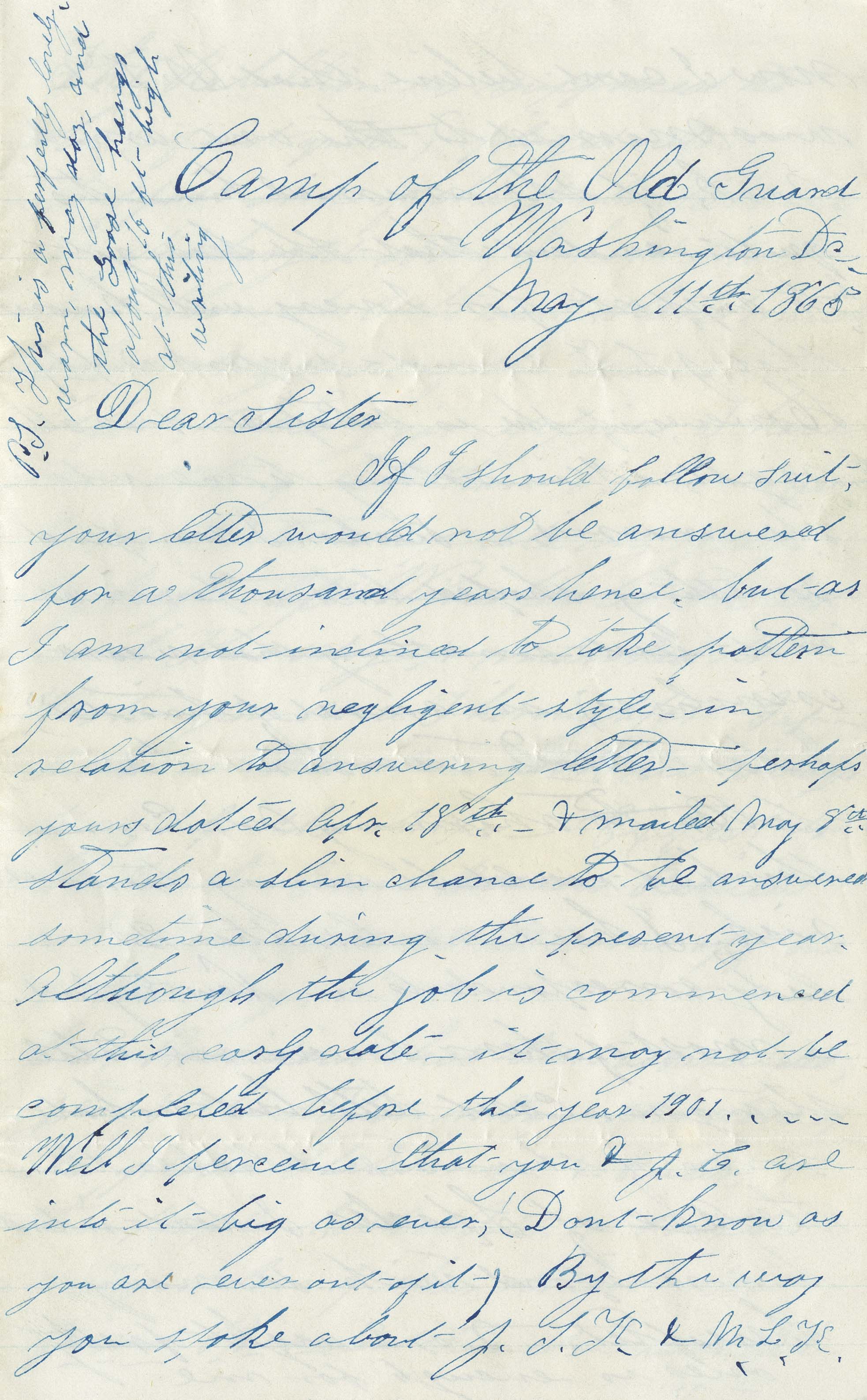
-
Description
Letter written by William H. White from Camp of the Old Grand, Washington, D.C, to his sister in Milwaukee, Wisconsin, describing the reaction of the soldiers to the assassination of President Lincoln.
-
Source
Samuel White Papers, 1862-1865. University of Wisconsin-Milwaukee Libraries, Archives Department
-
Rights
This item is in the public domain. As a service to other researchers, we request that users credit the University of Wisconsin-Milwaukee Libraries as the source.
-
Creator
White, William
-
Date
May 11, 1865
from Apr. 26, 1865
Letter Soliciting Donations
-
Full Title
Letter Soliciting Donations
-
Description
Circular letter soliciting funds for Mary Todd Lincoln.
-
Rights
The Providence Public Library encourages the use of all items in the Providence Public Library digital collections for fair use purposes such as teaching, research, and private study. It is solely the patron's obligation to determine and ensure that use of material fully complies with copyright law and other possible restrictions on use.
-
Tags
-
Cite this Item
Unknown. "Letter Soliciting Donations". Remembering Lincoln. Web. Accessed December 16, 2025. https://rememberinglincoln.fords.org/node/934
from Apr. 26, 1865
Letter Soliciting Donations
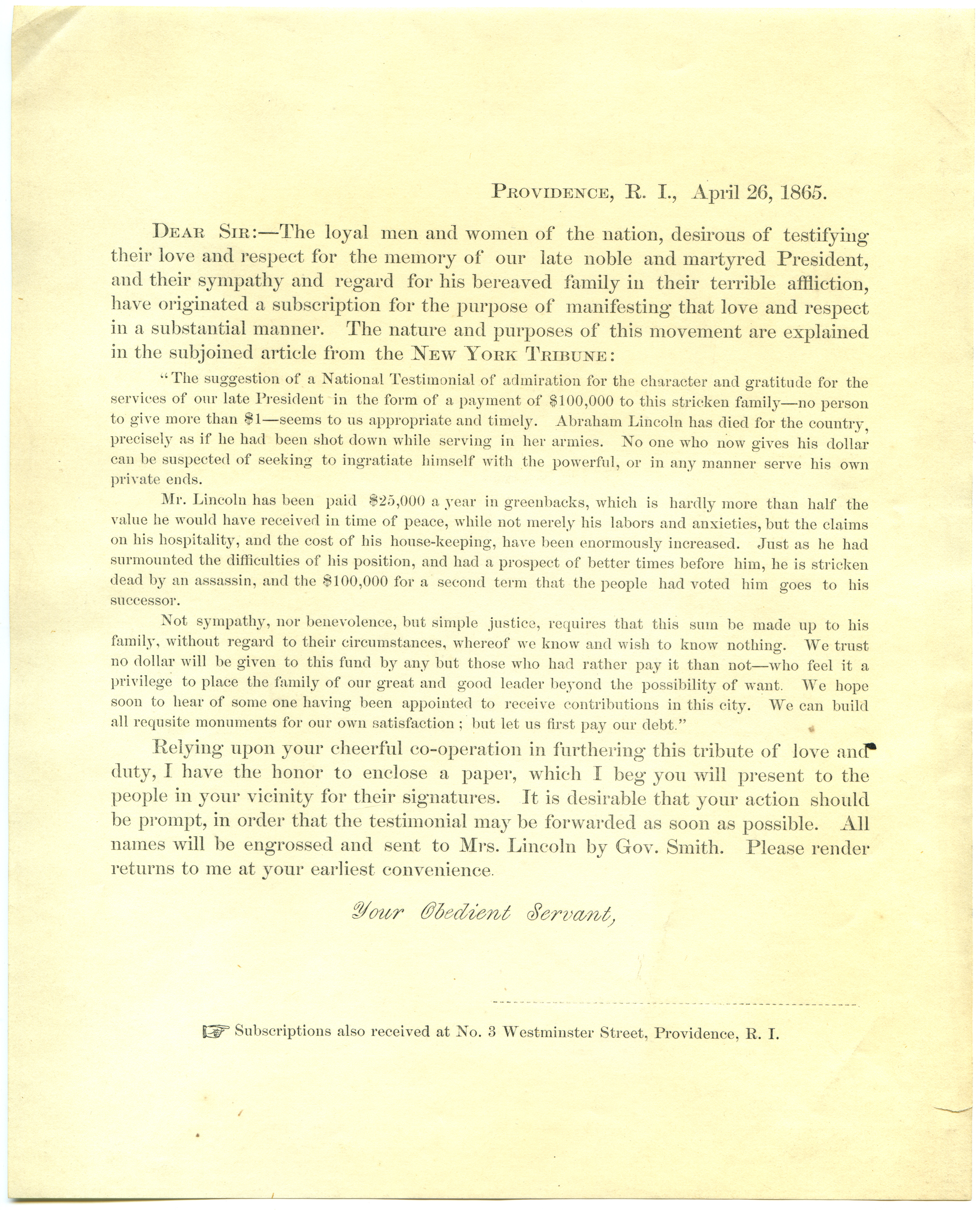
-
Description
Circular letter soliciting funds for Mary Todd Lincoln.
-
Rights
The Providence Public Library encourages the use of all items in the Providence Public Library digital collections for fair use purposes such as teaching, research, and private study. It is solely the patron's obligation to determine and ensure that use of material fully complies with copyright law and other possible restrictions on use.
-
Creator
Unknown
-
Date
April 26, 1865
from Apr. 19, 1865
Charles A. Jewell to Parents
-
Full Title
Charles A. Jewell
-
Description
Charles Adolphus Jewell II was born September 8, 1839 near East Jaffray, New Hampshire. In 1842, the family migrated to southern Michigan, settling near the town of Lime Creek. Charles later attended the newly formed Michigan Agricultural College, and in 1862, was a member of the second graduating class. Shortly thereafter, he joined the Union Army, serving in the 18th Michigan Volunteer Regiment until July,1865. Jewell describes the public mourning of Lincoln in Huntsville, Alabama, and the sorrow felt by the Union soldiers. He then discusses his involvement in violent retribution exacted upon anyone accused of celebrating the assassination. Jewell recounts an evening when Union soldiers patrolled the streets for "demonstrations of joy" and upon hearing such an act, tracked the supposed perpetrator to the home of a wealthy man. The soldiers broke in and threatened to kill the man, but he convinced them he said nothing against Lincoln. Jewell notes that a feeling of fear is palpable among Confederate sympathizers because they are afraid that African Americans working in their home may turn them in to Union authorities, but he also acknowledges that many southerners express grief over Lincoln's death because he was a relatively moderate politician. Then, Jewell details the funeral procession and his belief that the assassination has reinvigorated morale among overworked, underpaid Union soldiers.
-
Transcription
[Written sideways across top of page]
letter by the last mail that came through, from Jimmy. He was, and had been well,
We anxiously hope to see
those boys back with us
very soon. Churchill from Medina is here
and assigned to Co.
K. We have one recruit
from Monroe Co.
Those who ran away from
the draft will feel mean
enough now that the
recruiting is stopped.
They ought to be held
in deep disgrace by all,
hereforth. The Col.
Doolittle has not got
his Commission yet.
so Horner Hulburd and
Hinkly cannot muster
Cap Babcock has gone home,
Love to all
Charles
PS I forgot to say that my
money is almost all
gone. And no signs of
Pay-master, if [illegible in original]
is [illegible in original] still, or any body
else, please send me
$25.00 and if you don’t
get another letter
with news from the Pay master
within a week from the time
you get this, and no oppor
tunity offers of sending other
wise, please send the same by mail.
Charles
[End]
Huntsville Ala
April 19th 1865
Dearest Parents:
The mail is finally through
again, after long long days of waiting and
I have got the earnestly looked for letter from
you. The bridges have been on
both roads between here and Nashville
and we have had no news-absolutely
nothing – except the very little by telegraph.
What doleful times! For three days, we
have mourned the death of that great
good man, Abraham Lincoln.
The deep mouthed cannon have boomed
the bells have tolled, the Band has played
his funeral dirge. The soldiers are
heart-broken, I can scarcely repress tears
of grief as I write. We trusted him with
the implicit faith of a father. We knew he
was the soldier’s truest friend. Every thing
seemed confused-lost-bewildered, and the
nation like an orphan child.
[Written upside down on first lines of page]
The Detroit Tribune came this morning and I was very much pleased
to see the article on the Agricultural College. It seemed to be progressing finely.
[End]
Indignation knew no bounds. Men of
great temperament- Christians, -men of no
passionate character- all soldiers, were ready
to sacrifice the life and property of any who
showed by word or deed, any signs of joy.
We would have burned that town I verily believe
I would not have hesitated to shoot any citizens
or burn any dwelling, had I heard murder
and treason, combined, from any lips. I was
never so exasperated. Officers and men paraded
the streets – I might say patroled- armed; on
purpose to spy out any demonstrations of joy.
In the dim twilight- A voice was heard to execrate
his name and express joy at his death. The soldiers
rushed for the man- they thought they tracked him
to a splendid residence! they threw open the doors,
seized a man –who was sitting, reading, by the
hair, brandishing their bayonets, and some
shouting “kill him” ! but they dragged him to
the light – and became convinced he was not the
man. He says he fully expected to die, for a
few moments. The citizens are trembling, They
don’t know but their negroes may have over
heard some word of joy. Most of the really intelligent
citizens are far from joyous, for they see plainly
how the bloody – dastardly act has widened, deepened
the abyss between the Northern masses, and the
Southern fire-eaters. They see that unless peace is
hastily made now – no mercy can be expected.
We will burn, pillage, annihilate if necessary- but
such a red-bloody- dastardly, political party must
not live in these U.S. Should the news reach Sherman
on the eve of a battle with Johnson, what earthly power
could stop them- they would show no mercy!
The procession here yesterday was the most
solemn I ever witnessed! The whole military force
was out marching in open order- with arms
reversed, and with slow and solemn tread,
keeping time to the sweet- tho mournful- deeply
sadly mournful music of the Band, And the
deep-toned cannon-every half-hour thundered
forth something of the fierce-determined, spirit of
vengeance, that filled the hardened breasts of those
who had witnessed many scenes before, that stir
men’s souls. Yet I never saw such terrible feeling.
It was not the noisy, frothy [ebullitious?] that broke forth
when Sumpter fell, nor yet the common sorrow that
all felt at Bull Run. It was like the silent heaving
of the volcano. Men who have been waiting so patient
ly for these expirations of their term of service, whom no money can
hire to reenlist, who spurn the price of a substitute – said in
a subdued tone – low but terrible – between their teeth- “I” am
ready to re-enlist as long as any murderers are left.” and they
would have done it. The feeling is universal. Men who
have not supported the President feel as deeply as we, who do. &
have. It was a foul stab at the Nation’s honor!
We don’t get news from Johnson & Sherman – indeed get no
papers, yet. By telegraph, we learn that Mobile is ours. –and from
the rebels that Forrest is badly defeated. How can the war last?
If we must devastate the whole South, and exterminate the
whole population of fire-eaters give us the word, and we will
form a skirmish line, and burn the country. But who is
to ‘give the word’? – Alas! our Commander in Chief –our
beloved leader is no more and who is left that can so
well, bring peace to us? God grant that this mantle may
fall upon his successor. He has nothing of the natural
ability of Abraham Lincoln.
Andrew has just arrived and has been in to see me. He
left the sugar which is delicious and means much more
to me than the mere gratification of appetite. It assures me
that “they miss me at home.” God bless you all, for your
love, and thoughtfulness of me. I do not know how Will
feels but I think he has given up the Regular Army, and
I do not see any opportunity for myself, tho I am still of
the opinion, that, should an opportunity occur, of joining with
my present rank, it would be the best opening for me.
I should be continually miserable in the neighborhood
of soldiers if I were not with them. The drills, the music,
the marching, the very buttons of the uniform are dear to me,
and I feel such thrills of pride, sometimes, on parade
and marching, and guard-mountings! as I never expect
to feel from any other employment. But I expect to give it
up, and be a farmer. My name has gone forward for
promotion to the 1st Let. I was not consulted – I am not aware
that any influence was exerted with the Col. since the Adju
-nct says he simply stated the facts to him. I am to go in
ahead of Lee-Baron. The prospect of a speedy closing of the war
induced me to let the thing run tho I didn’t know of it till the
recommendation was mailed, to the A.G. of Mich. My com
-mission has not arrived. You are entirely mistaken, my
dearest mother, in regard to my health. – I was never in better health. X
the reason you have not heard from me, is partly because we have
been off on a number of Raids (which I have not had room to recount)
and then because the mail has been stopped by the floods. If the mails
are only regular, I will try to write as often as once each week. I got only
your letter tonight- but it was I wished most to see. I read a
[letter continues to left side Scan 1]
-
Source
UA.10.3.5 - Charles A. Jewell II Papers
-
Rights
Educational use only, no other permissions given. Copyright to this resource is held by Michigan State University and is provided here for educational purposes only. It may not be reproduced or distributed in any format without written permission of the University Archives & Historical Collections, Michigan State University.
-
Tags
-
Cite this Item
Charles Adolphus Jewell II. "Charles A. Jewell". Michigan State University Archives & Historical Collections. Remembering Lincoln. Web. Accessed December 16, 2025. https://rememberinglincoln.fords.org/node/869
-
Creator
Charles Adolphus Jewell II
-
Publisher
Michigan State University Archives & Historical Collections
-
Date
April 19, 1865
-
Material
Ink and Paper
-
Dimensions
8" x 10"
from Apr. 19, 1865
Charles A. Jewell

-
Description
Charles Adolphus Jewell II was born September 8, 1839 near East Jaffray, New Hampshire. In 1842, the family migrated to southern Michigan, settling near the town of Lime Creek. Charles later attended the newly formed Michigan Agricultural College, and in 1862, was a member of the second graduating class. Shortly thereafter, he joined the Union Army, serving in the 18th Michigan Volunteer Regiment until July,1865. Jewell describes the public mourning of Lincoln in Huntsville, Alabama, and the sorrow felt by the Union soldiers. He then discusses his involvement in violent retribution exacted upon anyone accused of celebrating the assassination. Jewell recounts an evening when Union soldiers patrolled the streets for "demonstrations of joy" and upon hearing such an act, tracked the supposed perpetrator to the home of a wealthy man. The soldiers broke in and threatened to kill the man, but he convinced them he said nothing against Lincoln. Jewell notes that a feeling of fear is palpable among Confederate sympathizers because they are afraid that African Americans working in their home may turn them in to Union authorities, but he also acknowledges that many southerners express grief over Lincoln's death because he was a relatively moderate politician. Then, Jewell details the funeral procession and his belief that the assassination has reinvigorated morale among overworked, underpaid Union soldiers.
-
Source
UA.10.3.5 - Charles A. Jewell II Papers
-
Rights
Educational use only, no other permissions given. Copyright to this resource is held by Michigan State University and is provided here for educational purposes only. It may not be reproduced or distributed in any format without written permission of the University Archives & Historical Collections, Michigan State University.
-
Creator
Charles Adolphus Jewell II
-
Publisher
Michigan State University Archives & Historical Collections
-
Date
April 19, 1865
-
Material
Ink and Paper
-
Dimensions
8" x 10"
from Mar. 25, 1865
Roland G.Smith to Cousin Nettie
-
Full Title
Roland G.Smith to Cousin Nettie
-
Description
Roland G. Smith, a resident of Burlington, CT, served in the 12th Connecticut Regiment during the Civil War. Over the course of the spring of 1865, Roland wrote several letters to his cousin Nettie from Savannah, Georgia and Summit Point, Virginia. Smith mentions the impact of Lincoln's death on the camp and general public.
-
Transcription
[Page 1]
Summit Point V.A.
April 17th 1865
Dear Cousin I received your kind letter the 14th and was glad to here from you once more and glad to here that you was well. there has been a good deal of exciting news since I wrote to you before and I have been in quite a martch to of about 80 miles. I sopose you don’t think 80 miles is very far but if you should come to walk it with a Gun and equipment to carry and a napsack on your back you would think it was a long walk. we left here the 4th went up the Valley about 40 miles to stop Genl. Lee from coming down the Valley case he should try to with what troop had left after leaving Richmond but after we
[Page 2]
Had got up the Valley about 40 miles we heard that Lee had surrendered to Grant with his whol Army so we turned back and are now at Summit Point again but I think we will move from here again soon but do not know. from the 2nd of this month up to the evening of the 19th we had Glorious news but the evening of the 14th we had very sad news you know what I mean of corse for you must of heard it and every body els in the United States. the murder of our President and Secretary Seward and Son seriously wounded we have not got the particulars of the news yet here but will tonight when the papers come I sopose you know more about it than I do, but I tell you it makes for sad times here all the Bands playing solemn airs and the flags at half mast and so I hope the scoundrels that done it will be cached and hanged at the first Tree they come too …
I have cached an awful cold and it has settled in to my eyes. and my right eye is swelled so I can not see out of it and I haf to keep it done up so you see I have not got but one eye to see to write with and that one is sore and it makes it ache to write so I guess this wont be a very long letter and it is wrotd so poor I guess you wont care but a short is better than none perhaps I am in hopes this war will soon be over so I can come and see you instead of having to write so much I think I shall be to home by fall if I live until that time every thing looks favorable now I think for a speedy Peace and I guess every body is longing to see it Sitzens as well as Soldiers…
I dont feel so as I could write much more this time pleas write to me after give me best respects to Uncle Chauncy and Aunt Caroline and Frankie and I send my best. Love to you so good bye for this time this from your Affectionate
Cousin
Roland G Smith
PS) pleas direct the same as before
[Page 3]
Savannah G.A.
June 22nd 1865
Dear Cousin I
received your kind ltr [letter] last night, I was glad to here [hear] from you once more and glad to here that you was well. I have not had a letter before since I left Washington 22 days ago until last night I got 3 last night one from you and one from Marie and one from a friend of mine in P.A. I have not heard from home yet since I left W. but I expect I shall soon when I wrote to you before I thought I should soon be home but the heacting of this letter dont look much like it nor
[Page 4]
does it the last day of May we thought we should be home in a few days and the first day of June we got orders to go to Savannah which nocked all our Home thoughts in the head June 1st in the after noon we got orders to pack up and be ready to move we got ready and started left our camp near Brightwood and matched down threw [through] the City to the Steamboat dock when we got Aboard of Steamer A. Harder and went to Alexandria there we got transfered [transferred] to an Ocean Steamer the Matanzas and started from Alexandria at daylight the 2nd got in to the Savannah River in the forenoon of the 5st and there we got transfered from the Mantanzas in to a River Steamer the U.S. Grant the Mantanzas drawing too much water to run up the River after we got on to the U.S. Grant we started go to Savannah at 6 Oclock [o’clock] P.M. the 5th got of [off] from the Steamer and matched threw [through] the City and went in to camp just out side of the City where the Regiment shift gunner’s but I dont remain there with them I am Fasining it the 9th of this month I was detailed as a safe guard out about a mile from camp most in a farmers place to keep the Soldiers from destroying his property he is a real nice man and good to the Soldiers to if they come and ask him to any thing he give it to them so they dont try to steal from him they dont bother me a tall I dont have any thing to do unless I am a ?nnd to any time I wan [want] to go to the City I can take his Horse and buggie [buggy] and go and if I am hungry I can get something to eat and that that is good to they live life tof here I tell you I shoudt [shouldn’t] complain of my duty here while I am in Savannah if I have the same duty all the while that I have got
[Page 5]
nice but still I had rather be discharged and to home than here after all but I dont think we shall get home nor ride away I think we are good for 6 months here in Savannah if not more it is a very prety [pretty] place here by prety sickley [sickly] we can get most any thing we want here Vegetables of all kinds most are in there prime now. and also Blackberry and Whistleberry are ripe now and a plenty of them at that so you see there is a plenty of every thing here now I dont know as I have got much more news to write this time pleas [please] write to me again soon for I like to here from you after I am well and hope this will find you and all your folks the same give my best Love to Uncle Channey and Aunt Caroline and Frankie and all enquiring friends and I send best Love to you so good bye for this time pleas accept these few lines from your affectionate Cousin
Roland G Smith
[Page 6]
Summit Point V.A.
March 25th 1865
Dear Cousin Nettie
I received your kind letter the 14th of this month and I should have answered it before but I have been on duty so much lately that I have not had much time to write. I was glad to here [hear] from you once more and glad to here that you was well and all the rest of your folks. have you heard from Father yet if you have let me know when you write again I have wrote three letters to him but have not got an answer from any of them if you have not
[Page 7]
heard from him lately I will write to his Captain and see what has become of him he may be a Prisoner as you say I guess he is if there aint [ain’t] any body heard from him lately for I am shure he would answer write to some one if he was not you said that you heard that Ida Hough was dead and wanted to know if I knew whether it was so I do not know whether it is or not but one of his Sons tents with me and he has not heard of it and if it was so I should thought he would heard of it. I havent [haven’t] got much news to write this time there is nothing new here the same thing left over and over day after day first Picket then Camp guard the Police and so on but I dont think we will hafto [have to] do a Soldiers duty much longer for I think this war is about over every thing looks like it was any way the South is whiped [whipped] now and they know it all the Private soldiers of the South say so and say there is no use of fighting any longer and they are deserting and coming in to our lines now as fast as they can there is a few leading men in the South that wanto [want to] hold out as long as they can now they know they are whiped but I dont think that can be very long now. but I am afraid that before or by the time that peace is declared between North and South that the United States will be at war with Foreign Naitions but I hope not but if it does we will hafto [have to] take it the best we can I suppose. the Bible says that all Naitions [Nations] shall be at war with each other and I think some times that this is the beginning of that war but I hope and Trust not though I hope the time will soon come when peace is restored
[Page 8]
To our land and that we Soldiers may go home once more and see our Friends and relatives and I trust God it will I dont [don’t] know as I have got much more to write this time please write to me again soon for I like to here from you often give my Love to Uncle Channey and Aunt Caroline and Frankie and all enquiring Friends and I send my best Love to you so good bye for this time this from your
Affectionate Cousin
Roland G Smith
PS) Please started the same as before
[Transcription by McCaela Michas] -
Source
Ms 101789
-
Rights
Use of this item for research, teaching and private study is permitted with proper citation and attribution to the Connecticut Historical Society. Reproduction of this item for publication, broadcast or commercial use requires permission. For permission, please contact the Connecticut Historical Society. chs.org/research/digital-reproductions.
-
Tags
-
Cite this Item
Roland G. Smith . "Roland G.Smith to Cousin Nettie ". Remembering Lincoln. Web. Accessed December 16, 2025. https://rememberinglincoln.fords.org/node/866
from Mar. 25, 1865
Roland G.Smith to Cousin Nettie
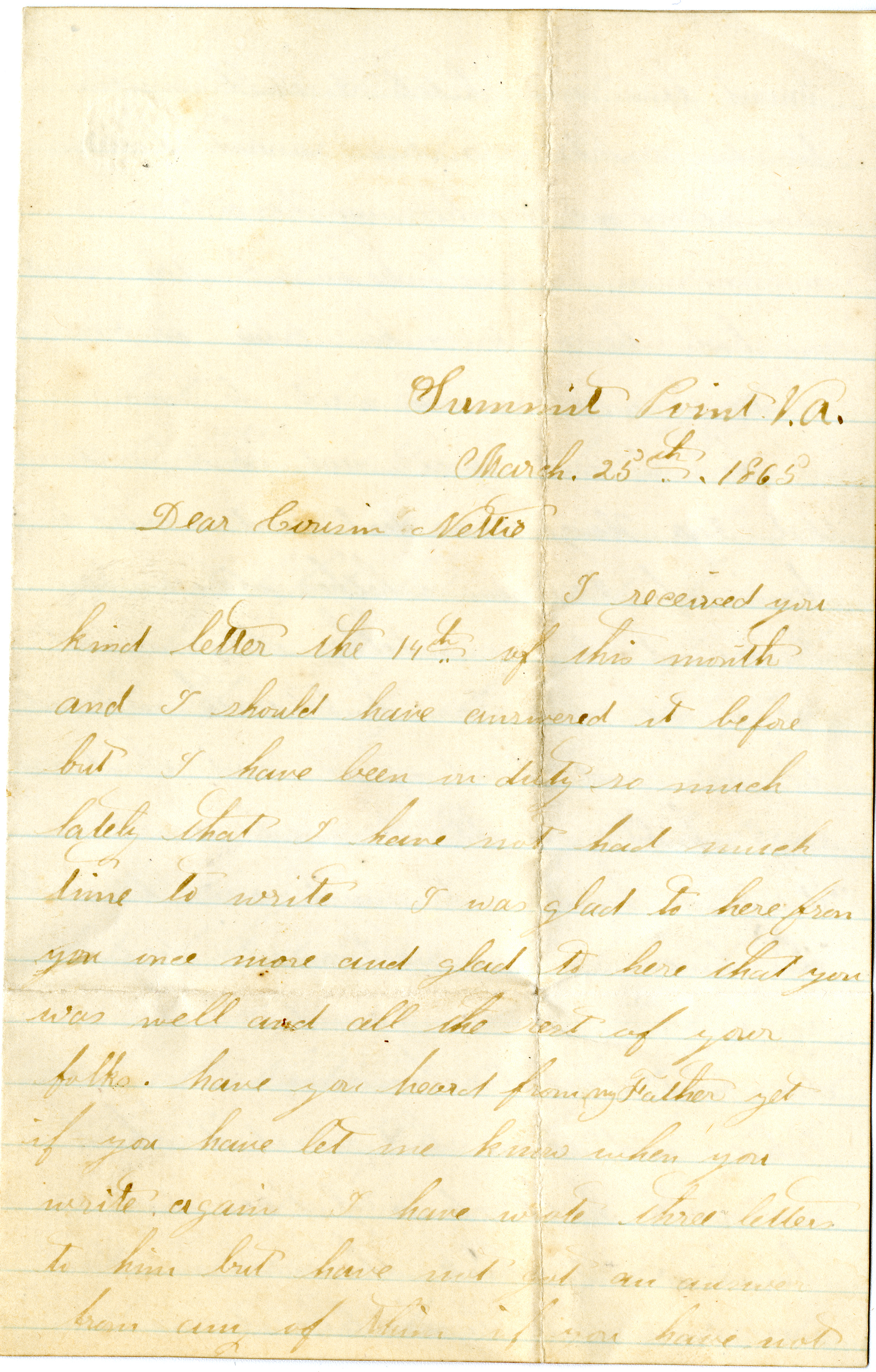
-
Description
Roland G. Smith, a resident of Burlington, CT, served in the 12th Connecticut Regiment during the Civil War. Over the course of the spring of 1865, Roland wrote several letters to his cousin Nettie from Savannah, Georgia and Summit Point, Virginia. Smith mentions the impact of Lincoln's death on the camp and general public.
-
Source
Ms 101789
-
Rights
Use of this item for research, teaching and private study is permitted with proper citation and attribution to the Connecticut Historical Society. Reproduction of this item for publication, broadcast or commercial use requires permission. For permission, please contact the Connecticut Historical Society. chs.org/research/digital-reproductions.
-
Creator
Roland G. Smith
-
Date
March 25, 1865
-
Material
ink on paper
-
Dimensions
16.5cm x 10.5cm (folded)
from Sep. 14, 2015
Julius to Oliver Dunks
-
Full Title
Dunks Family Correspondence
-
Description
Near the end of the second page, Julius Dunks begins to briefly describe the funeral for Abraham Lincoln in Union City, a village in Southern Michigan that served as an important juncture in the Underground Railroad. He notes that the townspeople intended to hold a procession, but a hard rain forced them to cancel.
-
Transcription
JSDunks
Apr 23 / 65
Union City April 23, 1865
Brother Oliver.
Your kind & wel
comed letter was rec - last
Friday. was kind a glad to
hear from thee. We have been
pretty busy the past week
monday & Tues forenoon I plowed
Thursday forenoon have about
another days work to do yet
it has rained conciderable,
this week and been very cold
Wensday morn. Father & I
went up to Mr Coats and
Bought a tree for stakes and
gave him 1.00 then he gave
us six other cuts so we
have about six hundred
stakes in all they are all
split but one. yesterday fore
noon I sharpened Stakes and
in the after noon I drew them
home & spread them arround
we have got about half of them
home. Father is going to sharpen
the rest of them & split that
out tomorrow. Coats also gave
us annother tree that was dead
for rails it is alittle rotten on
the out side but guess that
it is sound at the heart It
is a large Black Ash, we are
going to use it for rails we
have also bought the timber for
one thousand rails for 5.00 we
are to cut & Split ourselfs.
Mary has got over the measles.
and is pretty well. Mat has also
got well Ed [Burten?] was taken
but has not been very sick
Lucy Leigh is pretty sick with
them now. they had quite a time
here last wensday they held Mr
Lincoln Funeral that day the
church was crouded as full as
it could be. the church was
all draped in mourning.
just about they same as they did
there. they were intending to
have a procession but it rained
very hard. William received
that package last night. they look
very well I have not tried any
of them. I am going to take a lode
of Read Wheat out out to
Coldwater to morrow & Wm
is going with me. We heard to
day that uncle Georges Baby was
Just alive. [illegible in original] [music?] looks pretty
well. We sold 26 Bushels of corn
last week pert of it - 1.00 1.25- ,80
we have about ten Bush. left
the Sheep all look well we have
not got any lambs yet but guess
that they will be gin to come
the last of this week.
Who did Lib Dunks merey
has She had those photograph
yet I think that her foot mus be
well by this time. where is she
going to live, I have had quite
a time with my arm it worked
first rate I only Stopped work
one day It Swelled up pretty
big how does yours get allong
mother wants you to send
the scab home in a letter
so that she can vaxinate
Mary & Wm what is there
about [illegible in original] Bills that
you do not under stand then
would be a tiptop place.
Pleas write Soon
Yours J S Dunks
___________________________________
April 25 dear Brother I will try & fill the
sheat I am going to [start?] on my expedition
tomorrow morn ing Think I shall be gone
about 2 weeks the first time I am very
much pleased with the Pens. Who did [herb?]
Dunks marry that is what is his name
& what is his Business you did not
tell what those ties cost apiece
You Brother W C Dunks
-
Source
c.00123 - Dunks Family Correspondence
-
Rights
Educational use only, no other permissions given. Copyright to this resource is held by Michigan State University and is provided here for educational purposes only. It may not be reproduced or distributed in any format without written permission of the University Archives & Historical Collections, Michigan State University.
-
Tags
-
Cite this Item
Julius S. Dunks. "Dunks Family Correspondence". Michigan State University Archives & Historical Collections. Remembering Lincoln. Web. Accessed December 16, 2025. https://rememberinglincoln.fords.org/node/861
-
Creator
Julius S. Dunks
-
Publisher
Michigan State University Archives & Historical Collections
-
Date
April 23, 1865
-
Material
Ink and Paper
-
Dimensions
5" x 8"
from Sep. 14, 2015
Dunks Family Correspondence
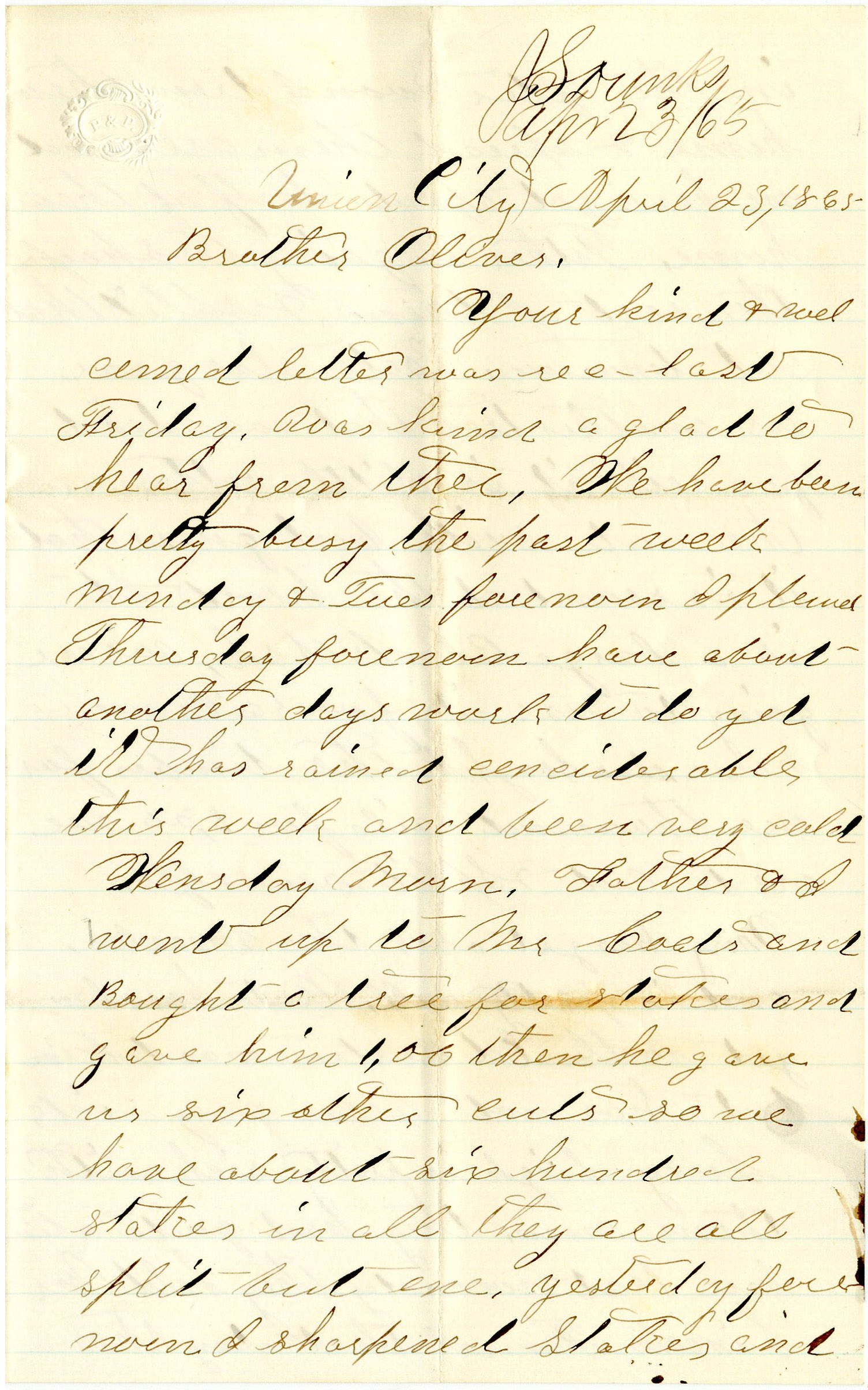
-
Description
Near the end of the second page, Julius Dunks begins to briefly describe the funeral for Abraham Lincoln in Union City, a village in Southern Michigan that served as an important juncture in the Underground Railroad. He notes that the townspeople intended to hold a procession, but a hard rain forced them to cancel.
-
Source
c.00123 - Dunks Family Correspondence
-
Rights
Educational use only, no other permissions given. Copyright to this resource is held by Michigan State University and is provided here for educational purposes only. It may not be reproduced or distributed in any format without written permission of the University Archives & Historical Collections, Michigan State University.
-
Creator
Julius S. Dunks
-
Publisher
Michigan State University Archives & Historical Collections
-
Date
September 14, 2015
-
Material
Ink and Paper
-
Dimensions
5" x 8"
from Sep. 9, 2015
Oliver to Tom Dunks
-
Full Title
Dunks Family Correspondence
-
Description
Oliver Dunks tells his brother, Tom, that he just attended the eulogy of President Lincoln at the Congregational Church in Detroit (most likely the church located at the corner of Fort St. and Wayne St.). He briefly describes the visual displays of mourning in the church and the city and concludes by observing that the country seems to be just as, if not more sorrowful for the death of Lincoln than they were for that of President George Washington.
-
Transcription
Detroit Apl 19 / 65
Dear Brother Tom
Your welcome
letter of the 17th just recd glad
to hear from you The loss
that you refer to that our
Nation has suffered is irreparable
shocking to think of but it
showes how he posesed the affections
of the hearts of the people I have
just been over to his funeral
at or eulogy at the Congrega
-tional Church the regular
funeral is to be next Tuesday
th City is draped in mourn
ing and has been from
the the time of hearing the
inteligence our Church was
draped clear around also and
all the front of the pulpet
I think that our country
mourned no more for
Washington than they have &
will for Father Abraham
I sent those pens this morn
and will enclose Bill
cost $66. you can sell them
in any shape that you can
holders or pens Chas had no
medium. Pens with Silver Holders
but will soon Sib is to be
married tomorrow morning
at Nine oClock I am invited
there is to be only the family
Henry has got back I have
just noticed that you say
that you will not go to
Coldwater until Monday
well all right I believe that
I would try awhile in
Coldwater I have not found
a Situation yet Please write soon
Your Brother
Oliver. S. Dunks
-
Source
c.00123 - Dunks Family Correspondence
-
Rights
Educational use only, no other permissions given. Copyright to this resource is held by Michigan State University and is provided here for educational purposes only. It may not be reproduced or distributed in any format without written permission of the University Archives & Historical Collections, Michigan State University.
-
Tags
-
Cite this Item
Oliver S. Dunks. "Dunks Family Correspondence ". Michigan State University Archives & Historical Collections. Remembering Lincoln. Web. Accessed December 16, 2025. https://rememberinglincoln.fords.org/node/860
-
Creator
Oliver S. Dunks
-
Publisher
Michigan State University Archives & Historical Collections
-
Date
April 19, 1865
-
Material
Ink and Paper
-
Dimensions
5" x 8"
from Sep. 9, 2015
Dunks Family Correspondence
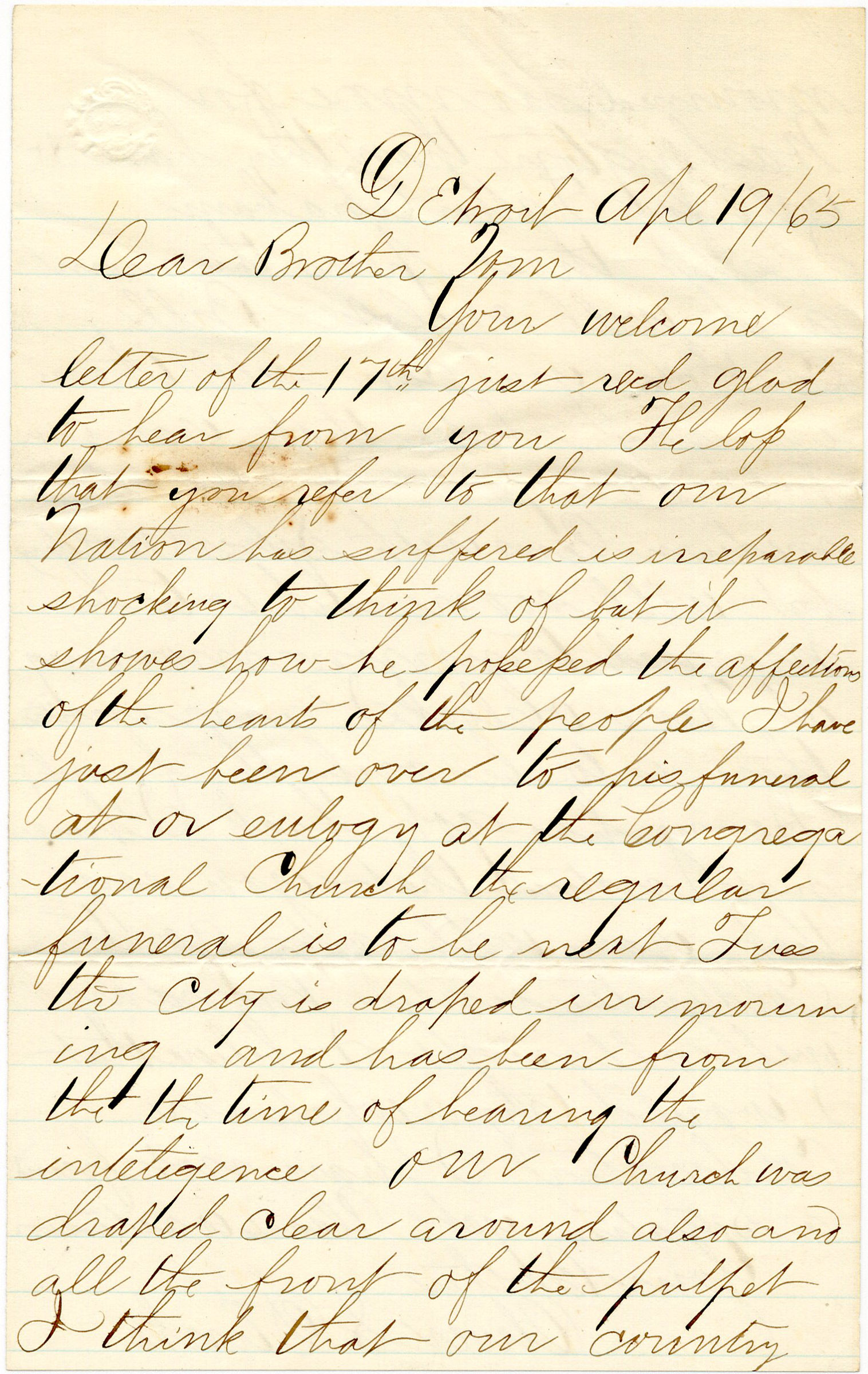
-
Description
Oliver Dunks tells his brother, Tom, that he just attended the eulogy of President Lincoln at the Congregational Church in Detroit (most likely the church located at the corner of Fort St. and Wayne St.). He briefly describes the visual displays of mourning in the church and the city and concludes by observing that the country seems to be just as, if not more sorrowful for the death of Lincoln than they were for that of President George Washington.
-
Source
c.00123 - Dunks Family Correspondence
-
Rights
Educational use only, no other permissions given. Copyright to this resource is held by Michigan State University and is provided here for educational purposes only. It may not be reproduced or distributed in any format without written permission of the University Archives & Historical Collections, Michigan State University.
-
Creator
Oliver S. Dunks
-
Publisher
Michigan State University Archives & Historical Collections
-
Date
September 9, 2015
-
Material
Ink and Paper
-
Dimensions
5" x 8"
from Apr. 17, 1865
8th Illinois Cavalry Letter
-
Full Title
8th Illinois Cavalry Letter in Reaction to Lincoln's Death - "The general reaction in this heart of the army is that of revenge."
-
Description
Letter from Dr. Abner Hard, a doctor in the 8th Illinois Cavalry, describing his reaction to the Lincoln assassination.
-
Transcription
Fairfax C.H. VA.
April 17th, 1865
Dear Ann,
Our joy is turned into sorrow at the awful and barbarous assassination of President Lincoln. The general reaction in this heart of the army is that of revenge.
He was too good a man to deal with such a set of traitors. They have sown the wind and will reap the whirlwind. I go with this Brigade to attend his funeral. We leave in an hour. I expect to take some of my family along. Love to you all, in health.
Your Rev. A Hard
-
Source
Milwaukee County Historical Society, Hard Family Collection.
-
Rights
This item is in the public domain and may be reproduced and used for any purpose, including research, teaching, private study, publication, broadcast or commercial use, with proper citation and attribution.
-
Tags
-
Cite this Item
Dr. Abner Hard. "8th Illinois Cavalry Letter in Reaction to Lincoln's Death - "The general reaction in this heart of the army is that of revenge."". Remembering Lincoln. Web. Accessed December 16, 2025. https://rememberinglincoln.fords.org/node/857
from Apr. 17, 1865
8th Illinois Cavalry Letter in Reaction to Lincoln's Death - "The general reaction in this heart of the army is that of revenge."
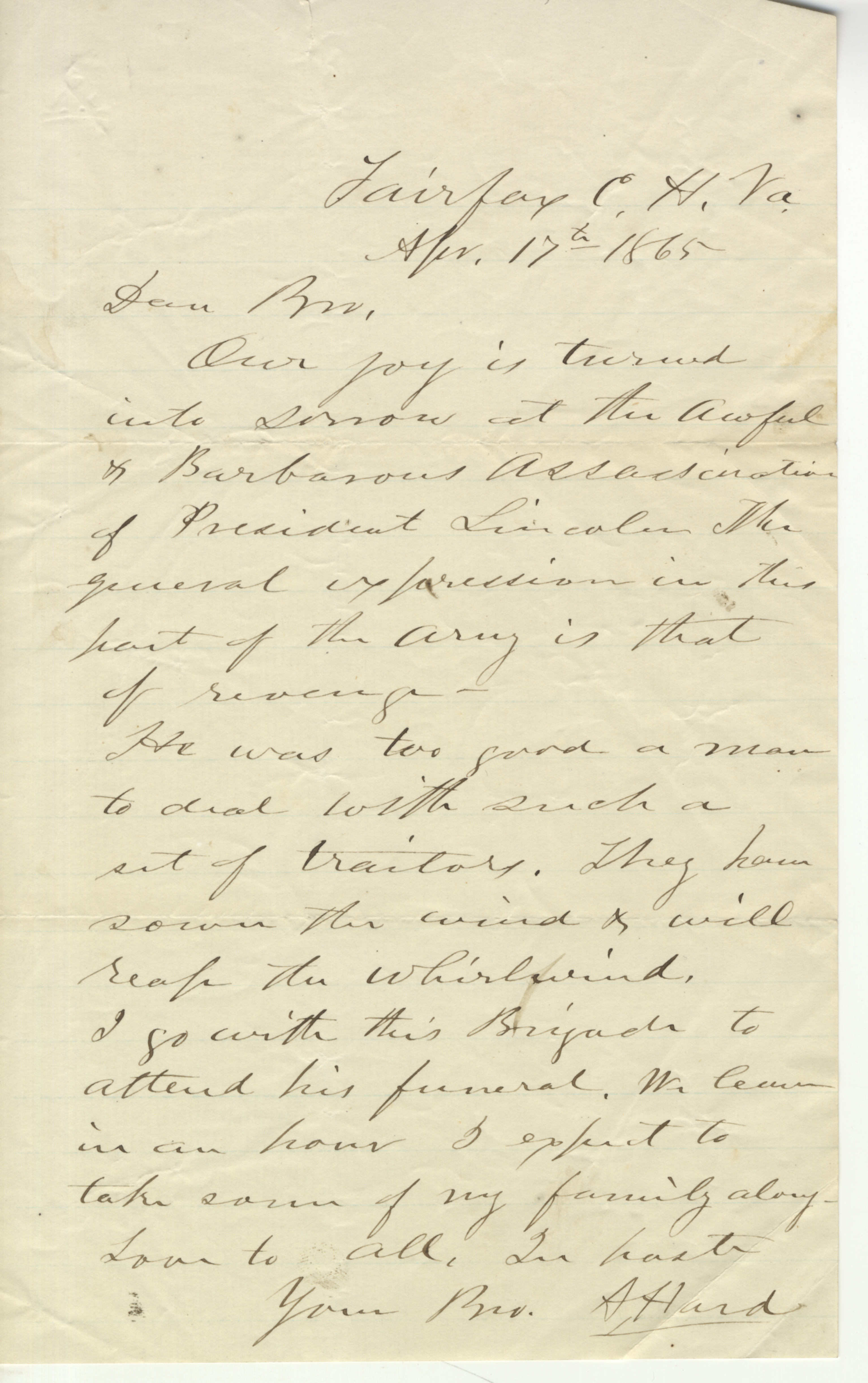
-
Description
Letter from Dr. Abner Hard, a doctor in the 8th Illinois Cavalry, describing his reaction to the Lincoln assassination.
-
Source
Milwaukee County Historical Society, Hard Family Collection.
-
Rights
This item is in the public domain and may be reproduced and used for any purpose, including research, teaching, private study, publication, broadcast or commercial use, with proper citation and attribution.
-
Creator
Dr. Abner Hard
-
Date
April 17, 1865
from Apr. 23, 1865
Letter to Jane Betts from Harriet Farley, April 23, 1865
-
Full Title
Handwritten letter to Jane Betts from Harriet Farley, April 23, 1865
-
Description
Handwritten letter to Jane (Young) Metcalf Betts from her aunt, Harriet Farley, in Burr Oak (St. Joseph County, Mich.), April 23, 1865. On the bottom of page one and top of page two, Harriet writes about the shocking news of Abraham Lincoln's death. She describes him as a "A father to his country, a tried friend of humanity". On Sunday, the local community marched from the Methodist church to the depot and had a public gathering with all three ministers present who spoke solemnly. She notes all town flags were draped in black. On Wednesday Elder Lamb gave a discourse at the Baptist house and Mrs. Wiltsie spoke at the schoolhouse. It is unclear if these last two speakers spoke of Lincoln or religious matters. This is a long (4 page) dense, chatty letter about marriages, deaths, family and local news unrelated to Lincoln. Jane (Young) Metcalf Betts and her husband 1) Taber Metcalf, later 2) William Betts, and her son, Irving Metcalf, lived in Burr Oak and Saint Joseph County, Michigan, as did her Aunt Harriet Farley. Irving served in Company D, 11th Michigan Infantry during the Civil War.
-
Transcription
[Page One]
Burr Oak [Mich.] Aprl 23, 1865
Sabbath afternoon
This is a cold, windy day
alone by the fire side [crossed out] I have been to church, was at home
by the fire side, thinking it a favorable time to[inserted] write somewhat
to Jane & Wm & Evy [Jane, William Betts and Irving Metcalf], I Fancy to myself how you look
there in your strange home. Have all the surroundings pictured
out in my mind. I received your letter of the 20th and one
from Phebe last week. She had not received yours at that time
the 13th. I presume she has written before this time and given you
the details of the singular disease which caused the death of
your Uncle Cotton, a Carbuncle we know must be very distress-
ing, but seldom proves fatal to life, Aunt Elesta writes
that he was prostrate almost form the first attack. They had a
serious time taking care of him 3 weeks. She says he was patient
through it all. They were feeling anxious about Frank, had not
heard from him since the last battle. I begin to think more about
going to see my folks, but life and all earthly things are so
uncertain we can know but little beyond the present.
Now I would say something about the shocking event which has
brought sorrow and mourning to so many hearts, but words seem
to weak and insignificant to express our individual feelings
and when we think of a nation bereaved of such a friend
as Abraham Lincoln! A father to his country, a tried
friend of humanity, we may only commune with our own
hearts and be still. Yet there have been efforts made here
as in other places to manifest the sincere love & great respect
that is justly due to so noble a man as our late President.
Last Sabbath an appointment was given out from the people to
[Page Two]
to meet at 3 o’clock at the Methodist church, from there
they marched down to the depot grounds where some preparations
had been made, the three ministers were present and each made
a speech appropriate to the occasion, It was truly a solemn time.
The old flag appeared impressive, draped in black on [inserted] almost every
house was the emblem of mourning, - On Wednesday the Baptist
house was crowded tho’ the rain prevented many from
attending. Elder Lamb gave a discourse as well as he was
capable of doing. In the evening Mrs. Wiltsie spoke at the
schoolhouse on the same subject. She had lectured here
the Friday before, and could not then say when she would
come again. On Monday afternoon I received a letter from her
stating that she would be here Wednesday evening, the time
was short to get notice circulated, no school, so there seemed
to be no chance to publish the appointment. A donation for
Elder Douste was to come off that afternoon and evening.
Under such circumstances we could not expect much-
However, to our surprise, the house was crowded, more than
could be seated, a very respectable and attentive audience.
Even Mr. & Mrs. Phelps, some of the WIllises and many other
Church members were there. I believe all were astonished.
The discourse was splendid. Some said she had her subject
well studied. She solicited bid for the poor soldiers, took
over twelve dollars, and nine dollars on Friday evening before.
Now it occurs to my mind I must tell you of another death.
Isaac Toll’s wife. The gay and musical woman has passed
from earth to the spirit world.
[Page Three]
It is getting late in the evening. I shall not be
able to finish my letter tonight. My eyes are quite weak.
They were very sore when my cold was so bad, my health
is pretty good again, my ear has come to its hearing again.
Carrie has been over to see me since I commenced writing she
is very kind and attentive since you left. So is Mrs. Cross
and all the folks. I shall not seem any time to be lonesome.
Monday morning [sidewise in the margin]
Mrs. Ward has bought a cow. I have all the milk that I need, and
Saturday Carrie churned, got a fine roll of butter. They intend to
sell the milk in future. Last week was a busy time with me
had visitors withal, Old Mrs. Vance from Branson staid [sic] with
me 3 nights, had the Gates one day, came in the morning, and
Mrs. Perry part of two days, staid [sic] over night, but not with me. I find
it rather difficult to get up a meal of vituals [sic] in order in my little
cluttered room, but make out to get along somehow, went over to
Ward’s to bake bread and pies. Thursday I got time to see some on
my dress, for the first since you left. Friday did a large wash-
ing (for me). Saturday finished the dress. It looks nicely, so the
ladies say, and I think so too. – Now withal[sic] the excitement and
doings that transpired last week Sarah Jane was married to
Dorsey. The wedding came off Thursday morning, and they
started on the cars, for a wedding tour, like other folks.-
Minta & the Col. Made quite a spread. They invited Mr. & Mrs.
Schmidt Mr. & Mrs. Parker and their daughter Mrs. Sutton,
Mr. & Mrs. McDonald, Elder Douste and lady of course, Ell Crane
and his lady were appointed to wait on the bridal pair, stood up
with them & etc. Kena was invited. She says everything was very
nice indeed. But there seems to prevail a general feeling of p8ity for the
Thoughtless girl.
[Page Four]
I don’t think of much more to write just now.
I read your letter to Father & Mother Betts. They seemed
to feel some better about you. I was not surprised
that you had rather a bad time of it at first, expected it
would be so. We were glad to hear that Evy’s eyes are well.
When I heard they were sore thought probably it would
result to the benefit of his general health as I think mine
did, tho’ I pitied him and you too. I heard from you
so often the time did not seem long since you wrote
to me, write when you can conveniently. Father Betts
talks of sending a bottle of ink, because you write with a
pencil every time. Charles was at home yet tho’ I heard
the children don’t mind this cough much, I believe it is
not the regular whooping cough. Now I think of a little
more to tell you tho’ not very interesting. George McMellin
was married [sic] week ago last Sunday to Mrs. Livermore’s daughter
Also Mrs. James ‘ daughter to Jake Whitman. Thus we hear of
deaths and mariages[a-inserted, sic]. Yet the world moves on in its course.
We think that Kena has got into the element that
suits her pretty well at last. She appears quite like a woman.
Has plenty of work, employs 3 women besides herself C and C.
Mary Ann Weaver got hurt badly by falling, was not able to do
anything the last I heard from her. It is now about 10 0’clock.
Have not had my breakfast yet. You will think it is time
for me to stop writing I hope. Wm. Will try to be more care-
ful of his health, and not work himself all up, be more patient.
I want to say to Everett He better get a few
more hens, if he can. I want to hear something
about Mrs. Leathrop next time you write. Harriet Farley
-
Source
Clarke Historical Library, Central Michigan University, Doris L. King Family Papers, 1822-1877
-
Rights
This item may be reproduced and used for any purpose, including research, teaching, private study, publication, broadcast or commercial use, with proper citation and attribution.
-
Tags
-
Cite this Item
Harriet Farley. "Handwritten letter to Jane Betts from Harriet Farley, April 23, 1865". Remembering Lincoln. Web. Accessed December 16, 2025. https://rememberinglincoln.fords.org/node/850
-
Creator
Harriet Farley
-
Date
1865
-
Material
Letter
-
Dimensions
10x15.5 inches
from Apr. 23, 1865
Handwritten letter to Jane Betts from Harriet Farley, April 23, 1865
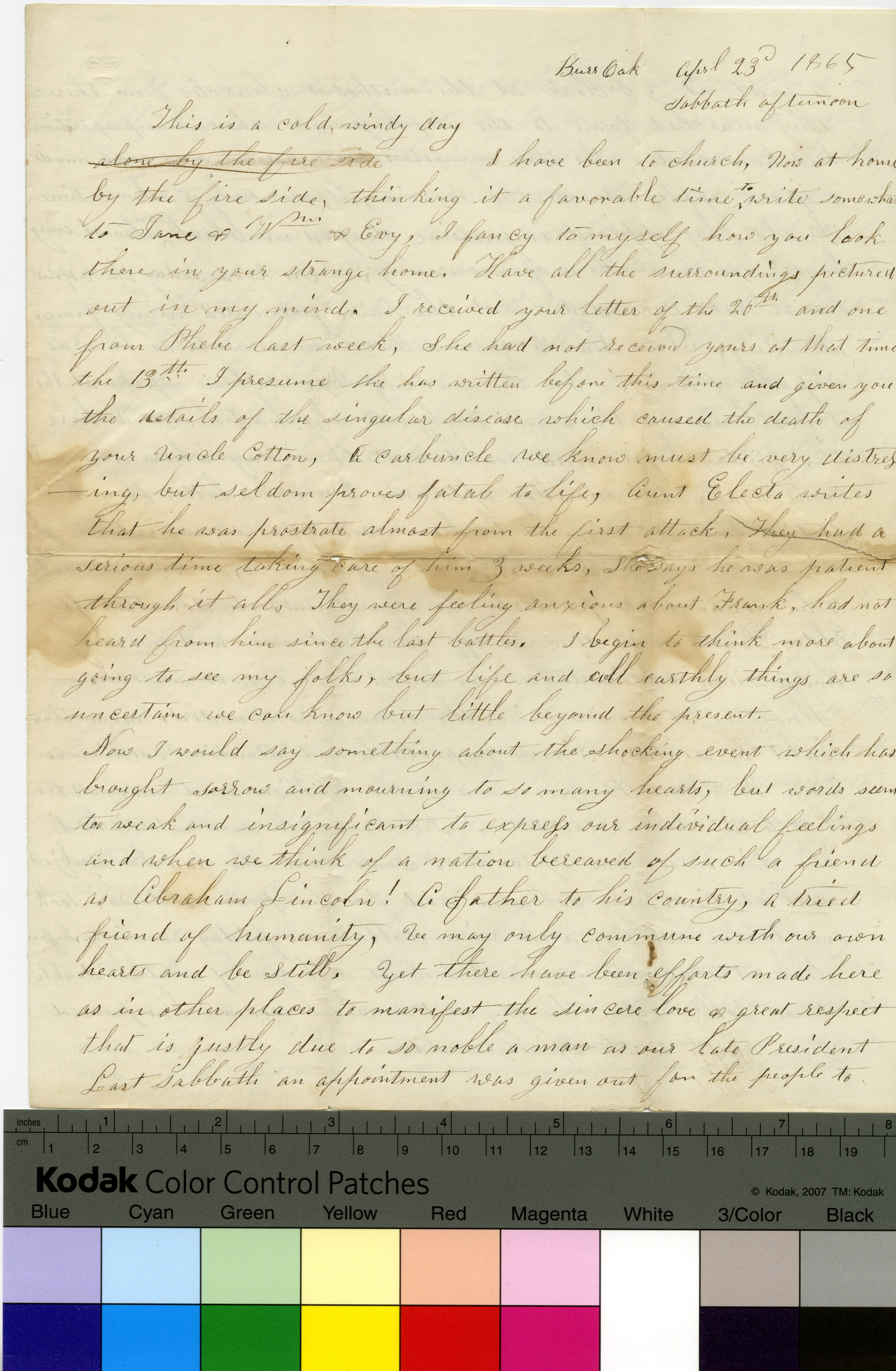
-
Description
Handwritten letter to Jane (Young) Metcalf Betts from her aunt, Harriet Farley, in Burr Oak (St. Joseph County, Mich.), April 23, 1865. On the bottom of page one and top of page two, Harriet writes about the shocking news of Abraham Lincoln's death. She describes him as a "A father to his country, a tried friend of humanity". On Sunday, the local community marched from the Methodist church to the depot and had a public gathering with all three ministers present who spoke solemnly. She notes all town flags were draped in black. On Wednesday Elder Lamb gave a discourse at the Baptist house and Mrs. Wiltsie spoke at the schoolhouse. It is unclear if these last two speakers spoke of Lincoln or religious matters. This is a long (4 page) dense, chatty letter about marriages, deaths, family and local news unrelated to Lincoln. Jane (Young) Metcalf Betts and her husband 1) Taber Metcalf, later 2) William Betts, and her son, Irving Metcalf, lived in Burr Oak and Saint Joseph County, Michigan, as did her Aunt Harriet Farley. Irving served in Company D, 11th Michigan Infantry during the Civil War.
-
Source
Clarke Historical Library, Central Michigan University, Doris L. King Family Papers, 1822-1877
-
Rights
This item may be reproduced and used for any purpose, including research, teaching, private study, publication, broadcast or commercial use, with proper citation and attribution.
-
Creator
Harriet Farley
-
Date
April 23, 1865
-
Material
Letter
-
Dimensions
10x15.5 inches
from Apr. 20, 1865
Letter to Elizabeth, April 20, 1865
-
Full Title
Photocopy of handwritten, unsigned letter to Friend Elizabeth, April 20, 1865
-
Description
Photocopy of a handwritten, unsigned letter from a Union soldier in Harper Hospital, Detroit, Michigan, April 20, 1865 to Friend Elizabeth [perhaps the widow Lib (Mrs. Levi) Smith]. The writer enjoyed her letter and hopes she is well. He is sympathetic over the loss of both her cousin and husband. The writer may have served or been hospitalized with both of these men. He heard from home that the president was killed. He notes that some people rejoiced over the news and two soldiers were fined a month's pay each and jailed because they rejoiced. He hopes the war will soon end as drafting and enlisting has stopped. He wants out of the hospital, either to return home or to his unit. He notes several who are ill. He writes that both his father and brother are in service. He concludes the letter because his hand shakes so he cannot hold his pen and asks her to write soon. The letter is part of the Levi Smith Family Papers, 1851, 1903. Levi Smith (1832-March 10, 1865) was the first husband of Elizabeth "Lib". He moved to Elba Township (Lapeer County, Mich.) from Ohio. Together they had a daughter. Levi enlisted in Company I, First Michigan Engineers and Mechanics on December 23, 1862 as an artificer. He died of disease in Detroit on March 10, 1865. She then married another man, also with the surname of Smith, and had three more children.
-
Transcription
Page One
Harper Hospital
Detroit, Mich.
April 20, 1865
Friend Elizabeth
It is with great pleasure that i
now sit down to answer your
kind letter which which [sic] i received
yesterday it found me well as
usual and hoping these few lines
Will find you well. It is very
Warm to day [sic] it must been hard to
lose your Cousin but it was harder
to part with your husband so kind
and good. There was bad news home
that our president was killed.
There was some that rejoiced [sp?] over
his death. There was ttow [sic] soldiers here
that rejoyced [sic] over his death and
they put them in the guard house
and they took two [crossed out] one month's pay
Page Two
From your [sp?] friend Zachary [sp?] Bigelow
away from them i don't think that
this war will last long then we
all can go home to our friends,.
They have stoped [sic] drafting and
they have stoped [sic] enlisting. i think
that we will get our discharge. i have
put in for an examination. i hope they
Will give me my discharge or send
me to my regiment. i get sick
of hospital life. There is 5 [?] that
is in a bed now. There have but one
that is dangerously sick. Holister is
sick. he has been sick about a week.
I got a letter from home mother
had put her ankle out of joint she
will have it pretty hard till some
of us gets home. Father is in the
service and my Brother is two [sic]. i haven't
Heard from father since the last furlough [sp?]
i will have to close for this time my hand
Trembles so that i can't hold my pen still.
Excuse me for this short letter. Write soon
-
Source
Clarke Historical Library, Central Michigan University, Levi Smith Family Papers, 1851, 1903
-
Rights
This item may be reproduced and used for any purpose, including research, teaching, private study, publication, broadcast or commercial use, with proper citation and attribution.
-
Tags
-
Cite this Item
unknown, part of Levi Smith Family Papers, 1851, 1903. "Photocopy of handwritten, unsigned letter to Friend Elizabeth, April 20, 1865". Remembering Lincoln. Web. Accessed December 16, 2025. https://rememberinglincoln.fords.org/node/849
-
Creator
unknown, part of Levi Smith Family Papers, 1851, 1903
-
Date
1865
-
Material
Letter
-
Dimensions
original was 4.5x7 inches, the photocopy is 8.5x11 inches
from Apr. 20, 1865
Photocopy of handwritten, unsigned letter to Friend Elizabeth, April 20, 1865
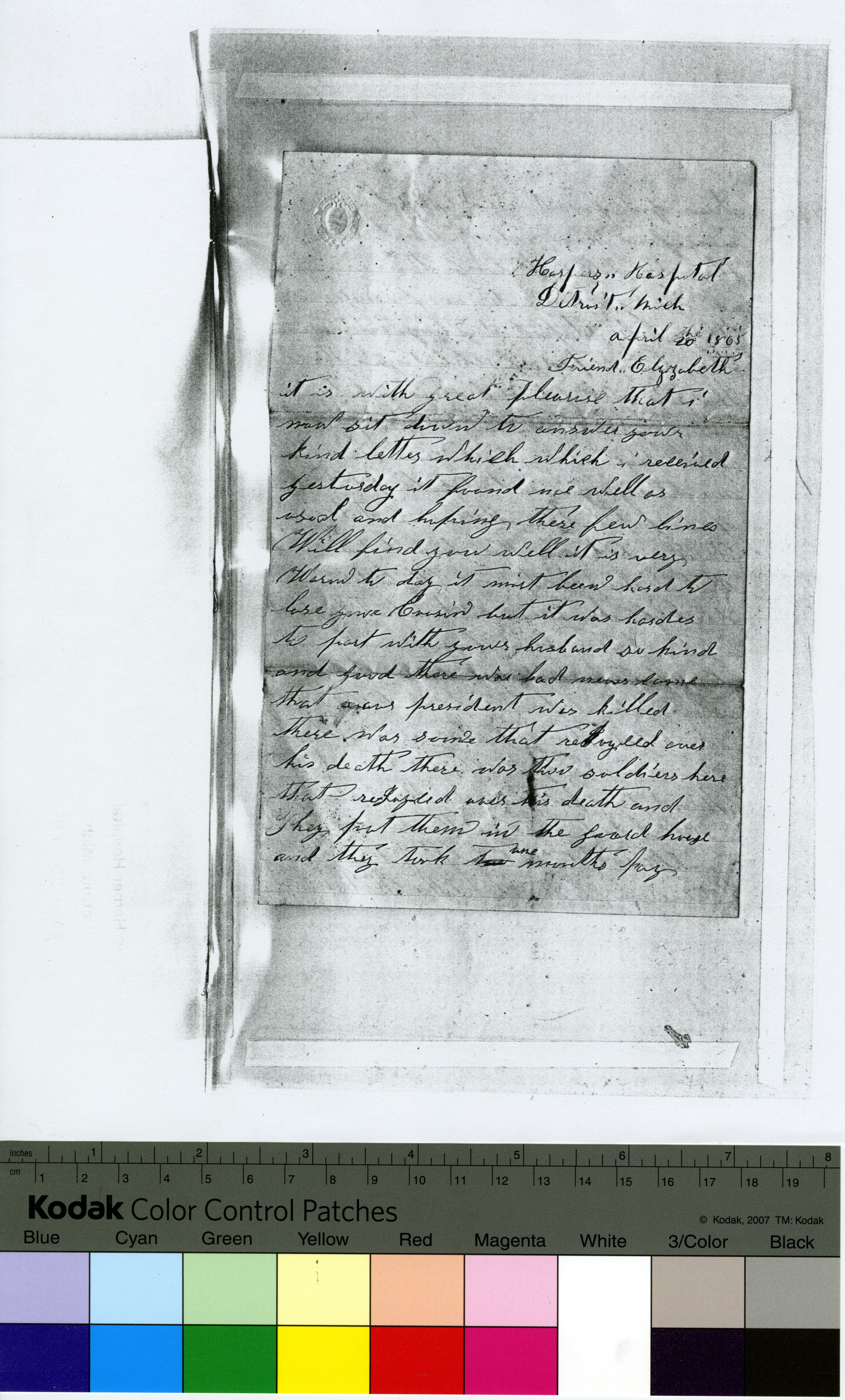
-
Description
Photocopy of a handwritten, unsigned letter from a Union soldier in Harper Hospital, Detroit, Michigan, April 20, 1865 to Friend Elizabeth [perhaps the widow Lib (Mrs. Levi) Smith]. The writer enjoyed her letter and hopes she is well. He is sympathetic over the loss of both her cousin and husband. The writer may have served or been hospitalized with both of these men. He heard from home that the president was killed. He notes that some people rejoiced over the news and two soldiers were fined a month's pay each and jailed because they rejoiced. He hopes the war will soon end as drafting and enlisting has stopped. He wants out of the hospital, either to return home or to his unit. He notes several who are ill. He writes that both his father and brother are in service. He concludes the letter because his hand shakes so he cannot hold his pen and asks her to write soon. The letter is part of the Levi Smith Family Papers, 1851, 1903. Levi Smith (1832-March 10, 1865) was the first husband of Elizabeth "Lib". He moved to Elba Township (Lapeer County, Mich.) from Ohio. Together they had a daughter. Levi enlisted in Company I, First Michigan Engineers and Mechanics on December 23, 1862 as an artificer. He died of disease in Detroit on March 10, 1865. She then married another man, also with the surname of Smith, and had three more children.
-
Source
Clarke Historical Library, Central Michigan University, Levi Smith Family Papers, 1851, 1903
-
Rights
This item may be reproduced and used for any purpose, including research, teaching, private study, publication, broadcast or commercial use, with proper citation and attribution.
-
Creator
unknown, part of Levi Smith Family Papers, 1851, 1903
-
Date
April 20, 1865
-
Material
Letter
-
Dimensions
original was 4.5x7 inches, the photocopy is 8.5x11 inches
from Apr. 16, 1865
Letter to his parents from J. D. McClure, April 16, 1865
-
Full Title
Handwritten Letter to Dear Parents from J. D. McClure, April 16, 1865
-
Description
Letter to his Dear (Unidentified) Parents from their son, J. D. McClure, April 16, 1865. McClure was in Memphis (Tenn.) setting up a business. He may have been from Iowa originally. McClure writes at first about moving to Memphis and having a tour of the town. Then he abruptly and emotionally transitions to having heard about the assassinations of President Lincoln, Seward, and Son that day from the boat coming from Cairo. He writes of the flags in town being at half-mast and draped in mourning [bunting]. McClure refers to the Secessionists as demons who will be destroyed by God. He then returns to the story of his tour of town, trying to help a lady find her husband at an unknown address, viewing the strong fortifications, battery, and garrison with lots of Union soldiers, the warm temperature and advanced state of growth in the trees and vegetables compared to those in the North, and how at present he has little business.
-
Transcription
Page One
Memphis, Tenn.
April 16th, 1865
Dear Parents:
I am here in the
beautiful city of Memphis in
the far flung South. I have
just got into the hotel from
a walk through the city
with a gentleman lawyer from
Michigan who has come
here to practice his profession.
Being acquainted he showed
many points of interest through
town. But Oh! Horror to
think of the awful calamnity [sic]
that has befallen our city[crossed out]
beloved country. In the assass-
ination of Lincoln Seward
and Son! The cold chills would
course my blood when first the
sad news reached my ears.
Page Two
2
The news first reached here this
morning on the boat from
Cairo. The news flew like
magic throughout the place
and the flags of the city were
hung at half mast, and
draped in mourning. What
horror to think our nation’s loss,
to see our Star Spangled banner
draped in mourning! “Whom
God will destroy he first maketh
mad”, and these demons, [of secession-inserted] are
surely sufficiently mad for
distruction [sic]. If possible I
will drive these thoughts away
for the present and write some-thing else. I got a carriage
this morning for Mrs. Billings
of Keohrels [sp?] who came down on
the same boat to visit her
husband. We rode for one hour
but did not succeed in finding
Page Three
3
as we had neither the name of
the street nor its number. But
we did see many most magnificent
business houses, Churches and residen-
ces. True I have not seen all
of the place by a considerable in
my hours ride, and two hours
walk. I have had a faint view
of the fortifications as I can have
now from my window. Yet,
Pickering is so situated as to
deal out distruction [sic] at a tremen-
dous rate to any foe the might
dare to approach from below or
above on the river, and it could
turn its mighty power from the
city to its utter demolition and
very hasty too. I see the large
guns standing upon the battery
ready at a single moments
warning, with its garrison of
over 3,000 soldiers within its
walls.
Page Four
Then how different the atmos-
phere here; the Sun is almost at
its meridian high to shining
forth its [genial-inserted] rays of warmth and
gladness. It is as warm here
as in June there, yet it is neither
sultry nor hot, but as I enhale [sic]
the atmosphere it seems cool
and embracing, much like we
sometimes have North just ater [sic]
a shower in a sultry hot
August day or the purer are [air-sic]
while the dew is rising in a
summers morning.
Then again how different
vegetation here; when I left
there was scarsely [sic] any of the
tees were putting forth their leaves
or buds, but before we reached this
point the peach and apple trees
had fruit put forth their blooms and
had fallen off. And to-day
the leaves on the oak and other
trees are almost full ground
and the gardens and yards are
green with grass and vegetables.
Page Four
But with all this I can’t tell
how I shall like the place.
I may not like the climate, the
the [sic] city, the practice to be had,
the people, nor the manner
of living. I do not know that
I have any occasion to be
discouraged unless it may be
from the high price of living.
It is Sunday and the most of
business is closed of course and
I am doing [sic] nothing in the way
of business. It will brobably [sic]
be one or two or perhaps three
weeks before I shall know
what to do. In the mean time
I shall enquire and remain
as contented as possible.
I guess it is dinner time.
I will write again when I
get more settled in business.
Your Affectionate son, J. D. McClure
-
Source
Clarke Historical Library, Central Michigan University, J. D. McClure Correspondence, 1865
-
Rights
This item may be reproduced and used for any purpose, including research, teaching, private study, publication, broadcast or commercial use, with proper citation and attribution.
-
Tags
-
Cite this Item
McClure, J. D.. "Handwritten Letter to Dear Parents from J. D. McClure, April 16, 1865". Remembering Lincoln. Web. Accessed December 16, 2025. https://rememberinglincoln.fords.org/node/848
-
Creator
McClure, J. D.
-
Date
1865
-
Material
Letter
-
Dimensions
8x9.5 inches
from Apr. 16, 1865
Handwritten Letter to Dear Parents from J. D. McClure, April 16, 1865
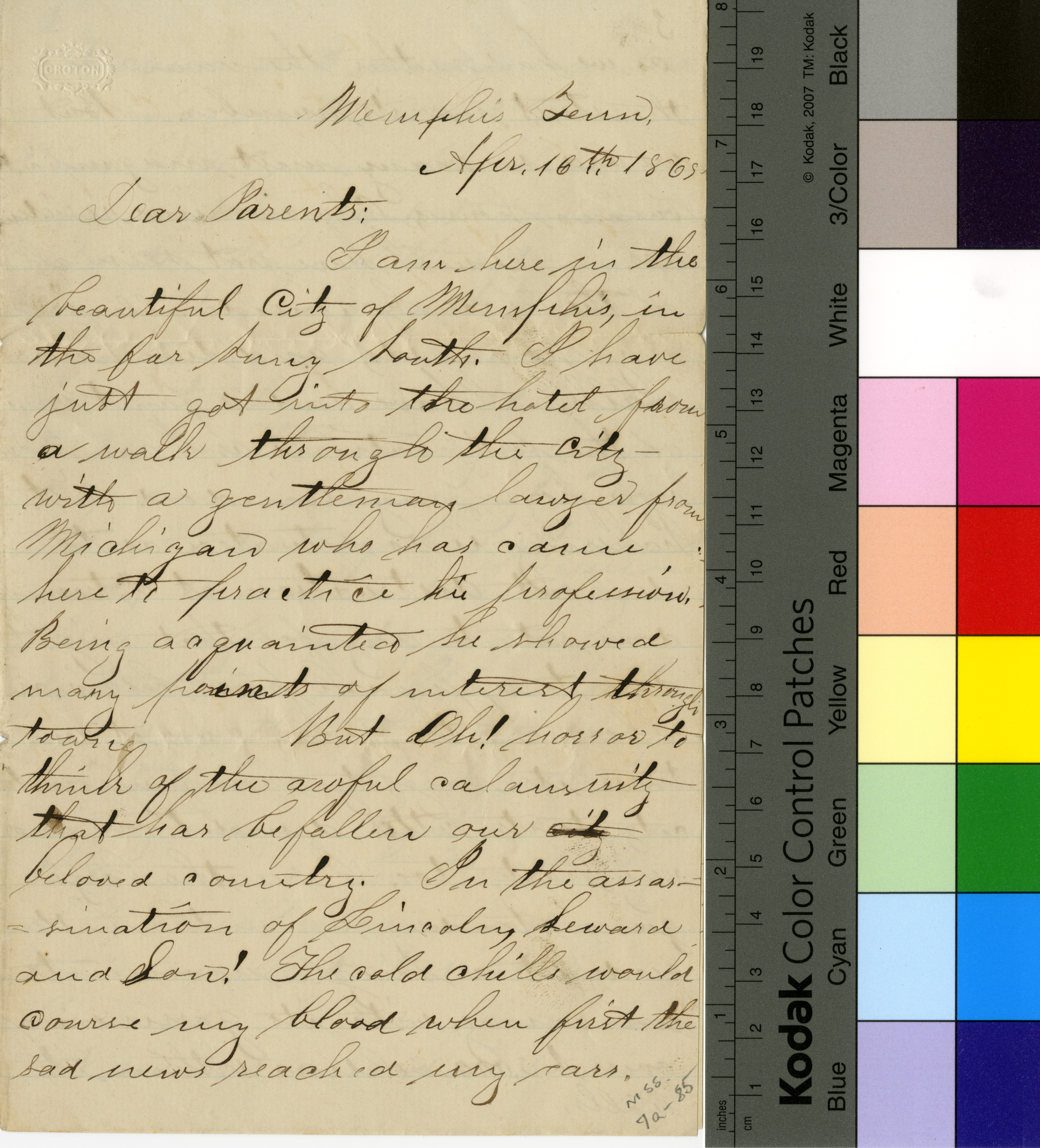
-
Description
Letter to his Dear (Unidentified) Parents from their son, J. D. McClure, April 16, 1865. McClure was in Memphis (Tenn.) setting up a business. He may have been from Iowa originally. McClure writes at first about moving to Memphis and having a tour of the town. Then he abruptly and emotionally transitions to having heard about the assassinations of President Lincoln, Seward, and Son that day from the boat coming from Cairo. He writes of the flags in town being at half-mast and draped in mourning [bunting]. McClure refers to the Secessionists as demons who will be destroyed by God. He then returns to the story of his tour of town, trying to help a lady find her husband at an unknown address, viewing the strong fortifications, battery, and garrison with lots of Union soldiers, the warm temperature and advanced state of growth in the trees and vegetables compared to those in the North, and how at present he has little business.
-
Source
Clarke Historical Library, Central Michigan University, J. D. McClure Correspondence, 1865
-
Rights
This item may be reproduced and used for any purpose, including research, teaching, private study, publication, broadcast or commercial use, with proper citation and attribution.
-
Creator
McClure, J. D.
-
Date
April 16, 1865
-
Material
Letter
-
Dimensions
8x9.5 inches


